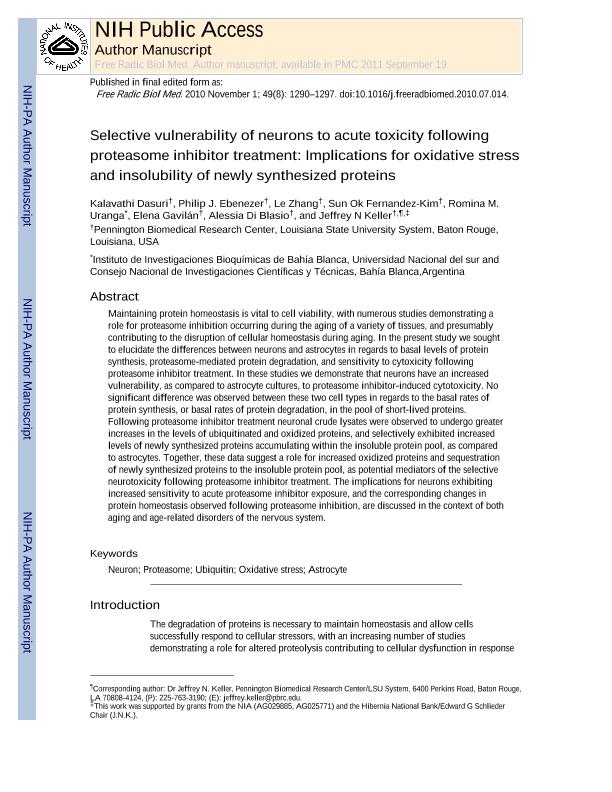Artículo
Selective vulnerability of neurons to acute toxicity after proteasome inhibitor treatment: Implications for oxidative stress and insolubility of newly synthesized proteins
Dasuri, Kalavathi; Ebenezer, Philip J.; Zhang, Le; Fernandez Kim, Sun Ok; Uranga, Romina Maria ; Gavilán, Elena; Di Blasio, Alessia; Keller, Jeffrey N.
; Gavilán, Elena; Di Blasio, Alessia; Keller, Jeffrey N.
 ; Gavilán, Elena; Di Blasio, Alessia; Keller, Jeffrey N.
; Gavilán, Elena; Di Blasio, Alessia; Keller, Jeffrey N.
Fecha de publicación:
11/2010
Editorial:
Elsevier Science Inc
Revista:
Free Radical Biology and Medicine
ISSN:
0891-5849
Idioma:
Inglés
Tipo de recurso:
Artículo publicado
Clasificación temática:
Resumen
Maintaining protein homeostasis is vital to cell viability, with numerous studies demonstrating a role for proteasome inhibition occurring during the aging of a variety of tissues and, presumably, contributing to the disruption of cellular homeostasis during aging. In this study we sought to elucidate the differences between neurons and astrocytes in regard to basal levels of protein synthesis, proteasome-mediated protein degradation, and sensitivity to cytotoxicity after proteasome inhibitor treatment. In these studies we demonstrate that neurons have an increased vulnerability, compared to astrocyte cultures, to proteasome-inhibitor-induced cytotoxicity. No significant difference was observed between these two cell types in regard to the basal rates of protein synthesis, or basal rates of protein degradation, in the pool of short-lived proteins. After proteasome inhibitor treatment neuronal crude lysates were observed to undergo greater increases in the levels of ubiquitinated and oxidized proteins and selectively exhibited increased levels of newly synthesized proteins accumulating within the insoluble protein pool, compared to astrocytes. Together, these data suggest a role for increased oxidized proteins and sequestration of newly synthesized proteins in the insoluble protein pool, as potential mediators of the selective neurotoxicity after proteasome inhibitor treatment. The implications for neurons exhibiting increased sensitivity to acute proteasome inhibitor exposure, and the corresponding changes in protein homeostasis observed after proteasome inhibition, are discussed in the context of both aging and age-related disorders of the nervous system.
Palabras clave:
Neuron
,
Proteasome
,
Ubiquitin
,
Oxidative Stress
,
Astrocyte
,
Free Radicals
Archivos asociados
Licencia
Identificadores
Colecciones
Articulos(INIBIBB)
Articulos de INST.DE INVEST.BIOQUIMICAS BAHIA BLANCA (I)
Articulos de INST.DE INVEST.BIOQUIMICAS BAHIA BLANCA (I)
Citación
Dasuri, Kalavathi; Ebenezer, Philip J.; Zhang, Le; Fernandez Kim, Sun Ok; Uranga, Romina Maria; et al.; Selective vulnerability of neurons to acute toxicity after proteasome inhibitor treatment: Implications for oxidative stress and insolubility of newly synthesized proteins; Elsevier Science Inc; Free Radical Biology and Medicine; 49; 8; 11-2010; 1290-1297
Compartir
Altmétricas



